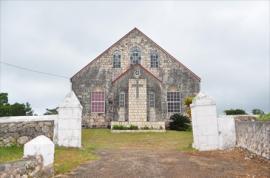
Maidstone Eyes Heritage Tourism

Nestled in lush, hilly terrain in North West Manchester, the community of Maidstone is, in some ways, like many others in rural Jamaica. The majority of the people live off the land, crime is minimal and most people have their ancestral roots right there.
Unlike some other communities, however, Maidstone is widely recognised for its historical value and holds rich promise as a heritage-based tourist destination.
Crucially, in 1838 when slavery ended in Jamaica, Maidstone was among the first communities to be set up as a free village.
In short order, Maidstone will be able to officially test its feasibility in the tourism sector as the Manchester Parish Development Committee (MPDC) embarks on the Mile Gully Heritage Loop tour which will showcase centuries-old cemeteries, churches, great houses and other identifiable historical sites in northern Manchester.
This heritage tour is among the economic projects developed as part of the ‘Manchester Local Sustainable Development Plan: 2030 and Beyond’.
Garth Smith, a former president of the Maidstone Community Council, told visitors to the 12th annual Fus’ a Augus’ Fair in the community on Emancipation Day that the area boasts artefacts and relics dating back to the height of slavery and British colonialism.
He referred to records of plantation society which show that the Maidstone plantation at one point had 65 slaves. Adjoining communities also had plantations and slaves: Glen Head had 77; Mons, 170; Johns Hall, 170; Huntley, 124; and Bath 13.
The records are uncertain in relation to slave numbers in Adams Valley and Top Sham, and an adjoining community to Bath called Timbuktu — said to be named for the African town of Mali from which some slaves originated — also had unspecified numbers.
For ex-slaves in the period immediately after Emancipation, the Church fulfilled not only religious purposes, but was the main source of education, community leadership and empowerment.
Perched on a hill overlooking the Nazareth All-Age School, where the artefacts are stored, is the Nazareth Moravian church. Community historians say it was originally built in the Adams Valley community, but that it was moved to a section of Maidstone called Nazareth in 1888 by German pastor William Fuerstenberg. Stones from the old church were used for construction.
“Of all the buildings in the Maidstone community, the church is the one in its purest state. In 1997, the National Church Service was held here to mark the return of the celebration of Emancipation to the calendar. It was then regarded as one of the best-kept edifices on the island,” Smith told the Jamaica Observer Central.
He said relatives of ex-slaves would have been the original members of the church and slaves are said to be buried at the nearby Nazareth or God’s Acre cemetery.
Close to the church are an old great house and an old slave hospital; and an elevated point known as “trial hill”, where slaves were reportedly taken for trial by their masters, can be seen in the distance.
There is also an old cheese factory on the church property which, it is said, was at one time the only one of its kind in the English-speaking Caribbean.
New president of the Maidstone Community Council Milton McNally says he and his team are intent on preserving the community’s rich heritage even as modern facilities are established. McNally said that Maidstone, which has about 1500-2000 people and is about 12 miles from Mandeville, would benefit from a training facility.
“These heritage sites are very, very important to the country and to the community. People are always interested in hearing about history and if we have a history to tell, we should tell it. I am looking at the development of the heritage, which has potential for a lot of funds in the area. I am looking at training, even a HEART Academy. We are trying to resuscitate the cheese factory and see whether it is practical to put it back into cheese or some other means of processing,” he said.
The Maidstone Community Council president said he has had preliminary discussions with the Social Development Commission on the subject of leadership training so that successors can always be in place and the development plans can be realised.